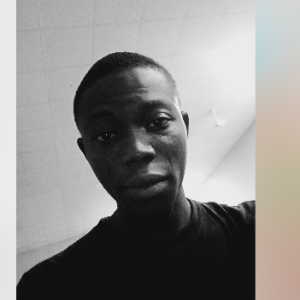Last August, journalist Alfred Olufemi traveled for a story to the state of Plateau in central Nigeria, which has been a hotbed of conflict in recent years.
Violence between the nomadic Muslim Fulani herders and Christian farmers in the state has claimed more lives than the Boko Haram jihadist insurgency in northeast Nigeria, and gang activity in the northwest. The violence has disrupted rural communities and threatened the country’s stability.
The week he returned home from Plateau, Olufemi pulled back from his routine social life as he struggled to get the victims' stories of sorrow and helpless rage out of his mind. "The psychological issues sometimes can really be a thing,” he said. “I became withdrawn from activities after visiting Jos. I guess it was a result of my interactions with [the] victims. I just had to take some days off the copy. On some occasions, it can be a result of burnout."
Mental health treatment is beyond the reach of the average Nigerian, and journalists like Olufemi are no different. One in four Nigerians — some 50 million people — suffer from mental illness. Yet there are only eight psychiatric hospitals in the country. Many citizens, too, cannot afford help when they need it, so they find other ways to cope.
"Since it was something I could handle, I only consulted friends and I was back to my normal state of mind. After all, seeking therapy costs money and I cannot afford it," said Olufemi.
His case is not unique. Many reporters have been exposed to traumatic work conditions and have dealt with anxiety, depression, burnout and post-traumatic stress disorder (PTSD), as a result. The global pandemic has only exacerbated this situation. A study published by the International Center for Journalists and Columbia University’s Tow Center for Digital Journalism showed that 70% of 1,406 respondents, across 125 countries — including Nigeria — “rated the psychological and emotional impacts of dealing with the COVID-19 crisis as the most difficult aspect of their work.”
Many newsrooms in Nigeria, too, don’t prioritize their reporters’ mental health, noted Olufemi. "Nigeria is a haven of traumatizing events, and it takes strong-heartedness to survive. Employers should look at ways to incorporate therapy sessions into the schedule of their reporters, even if it is [just] once a month.”
Addressing the issue
The Centre for Journalism, Innovation and Development (CJID) in collaboration with Free Press Unlimited (FPU) launched psychotherapy sessions under its ‘No News Is Bad News’ program for journalists in Nigeria and Ghana to assist reporters and media workers who are exposed to traumatic events.
“We want to promote better mental health and mindfulness among journalists. The nature of the work environment for journalists, where they must break the news, stay ahead of the curve and retain readership, can foster anxiety and lead to an array of psychological challenges,” said Stephanie Adams, a program officer at CJID. “The constant exposure to trauma and disturbing content — photos and videos — encountered while covering violence, tragedies, natural disasters, crimes and murder put journalists at a higher risk of developing mental issues such as PTSD.”
In 2019, CJID gathered a group of reporters for mental wellness counseling at a psychiatric health facility in Abuja, Nigeria. The first session focused on anger management and developing coping skills when confronted with the stressors that accompany being a journalist. To date, CJID has organized group and individual therapy sessions for over 100 reporters and media workers across Nigeria and Ghana.
“Journalists and media workers from mainstream and digital media [outlets] have benefited from this service alike. The welfare of Nigerian journalists and media workers should be a major concern of all media owners,” said Adams.
Initiatives like this help improve journalists’ welfare and optimize their productivity, said Kunle Adebajo, an investigative editor at HumAngle. “One thing journalists playfully joke about is to say there are no public holidays or weekends for journalists,” he said. “The job can be very demanding because the news does not tell when it is coming, and whenever it comes you have to attend to it. There are also journalists who cover hard issues, specifically conflict: reporting from conflict areas can have its own burden and is something that is difficult to grapple with.”
Newsrooms need to understand how the demands of the profession affect their employees’ mental wellbeing, Adebajo added. “Newsrooms need to be generous and flexible so that people can take breaks and seek professional help. This will enable [newsrooms] to rise to the occasion when [reporters] are not delivering because of psychological and emotional reasons.”
Challenges and plans for the future
Among the challenges CJID must address is convincing media workers to see psychologists.
“Journalists are always busy, and rarely make time for their sessions. We all know journalists care about every other thing and person — except themselves and their mental health,” said Adams.
CJID plans to expand its services to other countries in West Africa, including Gambia, Sierra Leone and Liberia.
"We are creating awareness of the services available and extending them to the other four countries [in which] we operate. Though we have been engaging journalists from neighboring countries virtually, we hope to have face-face interventions," said Adams, adding that CJID is also encouraging newsrooms to invest in programs that provide psychosocial support for their staffers.
Photo by Christina @ wocintechchat.com on Unsplash.


